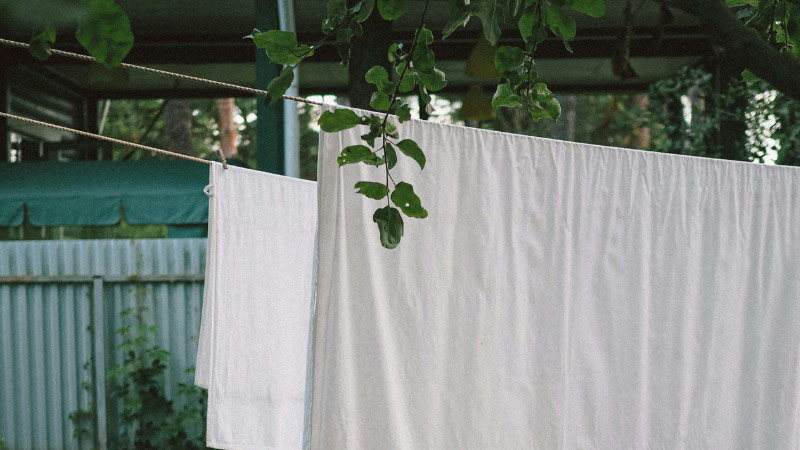Eco-friendly alternatives to traditional laundry detergent
Author: Brianna Orr
Posted on Jun 18, 2024
Category: Opinion

Laundry, that age-old chore we all know too well, has a significant impact on the environment. Have you ever stopped to think about it? Traditional washers and dryers consume quite a bit of water and energy, putting a strain on conservation efforts and increasing greenhouse gas (GHG) emissions.
Although modern machines exist that prioritize water and energy conservation, most of us don’t own them due to their hefty price tags. So, what can we do to make our laundry practices more eco-friendly?
Many laundry detergents are packed with chemicals that harm the environment by polluting our waterways and damaging ecosystems. A simple way to make our laundry routines more eco-friendly is to reconsider the substances we use. Here are some alternatives worth considering:
Eco-friendly detergent sheets
Laundry detergent sheets present numerous environmental benefits over traditional liquid detergents and pods. Their lightweight and compact design significantly reduces GHG emissions, with transportation requiring less fuel.
These sheets are often free from toxic ingredients, safeguarding both your health and our waterways. Additionally, they come without plastic packaging, unlike single-use plastic containers used for liquid detergents, contributing to substantial waste reduction. They offer a more sustainable alternative through lower emissions, safer ingredients, and minimized plastic waste.
How to use: For standard and high-efficiency (HE) machines:
The method for using laundry detergent sheets varies by type, so refer to the detailed instructions on the packaging. Typically, you place a portion of the sheet or the entire sheet inside the machine's drum with your laundry load.
Available here:
- Earth Breeze Laundry Detergent Eco Sheets
- TruEarth Laundry Detergent Eco-Strips
- Kind Laundry Detergent Sheets
Dr. Bronner’s Sal Suds Liquid Cleaner
Dr. Bronner's Sal Suds Liquid Cleaner is not soap; instead, it's a potent, concentrated all-purpose cleaner designed for nearly any wet surface. The cleaner is crafted from plant-based surfactants, compounds that lower the surface tension between two substances.
With regards to laundry, these compounds help to break down and remove dirt and oil by allowing water to penetrate surfaces more effectively to lift them away. Dr. Bronner’s contains natural fir needle and spruce essential oils and lacks synthetic dyes or fragrances.
When it comes to laundry, Sal Suds excels at cleaning. Whether you're washing clothes by hand or using a machine, it delivers exceptional cleaning power while remaining gentle on the skin.
How to use:
- HE machines: Use 1 to 1 and a ½ tablespoons per load.
- Standard machines: Use 2 to 3 tablespoons per load.
Available here:
Soap nuts
Soap nuts, also known as soapberries, are dried shells from soapberry nuts. These shells contain saponin, a natural surfactant. Unlike traditional commercial detergents, which often contain dyes, fragrances, and preservatives, soap nuts are free from these additives.
This makes them an excellent choice for individuals with sensitive skin or allergies. However, they do not effectively treat tough stains, so pre-treating your load with natural stain removers like baking soda or distilled white vinegar is recommended before your wash cycle.
Scent-wise, soap nuts will not give your laundry the typical clean fragrance associated with well-known laundry detergents, as they leave clothes odorless. If you prefer scent-free laundry, that’s great! But if you want a pleasant aroma, consider adding a few drops of your favorite diluted essential oil (that does not stain clothes) to your bag of soap nuts.
Soap nuts do not shine when washing white or lightly colored clothes as it eventually results in greys, because of this, you might want to consider using the other eco-friendly alternatives mentioned for whites and lightly colored clothes.
How to use: For standard and HE machines
- Place 4-6 soap nuts in a small drawstring cloth bag (tie it closed) and toss them into the washing machine for each load. Soap nuts stain things they come in direct contact with. Making sure the nuts can’t escape the cloth bag is an important step.
- Leave the cloth bag in for both the wash and rinse cycles.
- Be sure to remove your cloth bag from the machine to let it and the nuts dry after each use.
Soap nuts can be reused for approximately 4-6 washes. Once they are grey and soft they are ready for composting.
Available here
Additional Eco-friendly tips for laundry
Use cold water: Heating water for laundry accounts for a significant portion of energy consumption. Washing clothes in cold water saves energy and reduces GHG emissions.
Air dry: Whenever possible, air dry your clothes. This not only saves energy but also prolongs the life of your garments.
Buy detergent at refilleries: Buying detergents at refilleries reduces the generation of single use plastic waste since you are reusing your containers.
Transitioning to eco-friendly laundry detergent alternatives promotes a more sustainable ecosystem. By making small changes to your laundry routine, you can reduce plastic waste and the emission of GHGs and toxins into the environment.